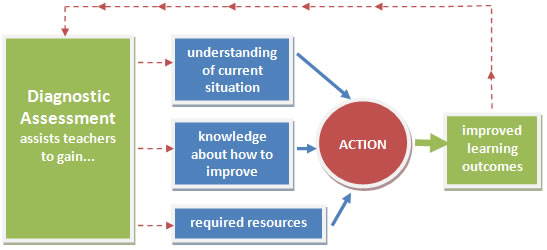Diagnostic assessments (also known as pre-assessments) provide instructors with information about student's prior knowledge and misconceptions before beginning a learning activity and also diagnose students’ strengths and areas of need.
These assessments also provide a baseline for understanding how much learning has taken place after the learning activity is completed. Instructors usually build concepts sequentially throughout a course. A diagnostic pre-assessment provides an opportunity to determine if students remember the concepts they need. If some students don't remember important concepts, then a refresher will make the current activity more meaningful and improve learning outcomes for students.

Benefits of Diagnostic Assessments
-
Indicate students' prior knowledge.
-
Assess the learning that has occurred during a teaching/learning session.
-
Can help instructors adjust content and activities to encourage more effective learning.
-
May make the teaching/learning process more efficient and effective by zeroing in on content that needs to be taught and mastered.
-
Can help students understand the value of a lesson, module, or entire course.
-
Can point out to students the gaps in student’s reasoning and misperceptions about subject matter.
-
May motivate students to seek accurate information and practice.
-
Demonstrate to students that their instructors care about them as people and about their success as learners.
Consider: What benefits of using diagnostic assessment can you see for your own classes? Consider these when drafting your course map and module worksheet at the end of this module.